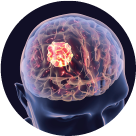Advanced, Accurate and
Hassle-Free EEG

Honest Pricing

Highly Experienced Radiologists

Advanced Imaging Diagnostics

Trusted, Transparent & Affordable

What is an EEG test?
The brain functions on electrical impulses that control every movement, voluntary or involuntary, and are the key to an optimally functioning body. This test assesses the electrical activity in the brain to determine any potential problems.
The EEG test is used to record the brain wave patterns which are displayed in a wave format, that allows the doctors to detect abnormal neural activities, indicative of seizures, epilepsy or other brain disorders.
The EEG test results are either displayed on a screen or are recorded on paper.
Why is an EEG required?

To detect brain tumours

To identify sleep disorders

To detect a stroke

To detect brain inflammation

To detect brain damage
Frequently asked questions
An abnormal EEG result denotes the presence of unusual electrical activity in the brain, which can be caused due to various neurological conditions and brain disorders.
An EEG doesn’t directly detect anxiety but is able to identify certain brain signals that are associated with depression and anxiety.
The EEG can detect abnormalities in the brain’s activity which can be indicative of a variety of brain disorders, brain tumours, and even brain damage from an injury.
Several studies have shown that an EEG is capable of detecting the presence of autism by monitoring the brain’s electrical activity and isolating discrepancies for further evaluation and autism diagnosis.
Yes, an EEG is an effective, painless, and non-invasive diagnostic tool that can detect the presence of several psychiatric and neuropsychiatric disorders.
No. You should not have anything to eat or drink for at least 12 hours before an EEG test. Stay away from caffeinated beverages during the fasting period and DO NOT take alcohol before the test.
While an MRI scan is the ideal image diagnostics tool to assess the brain’s structures, an EEG on the other hand focuses on the brain’s electrical activity which can give signs of several brain disorders, including seizures, epilepsy, dementia, etc.
